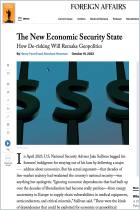Join getAbstract to access the summary!

Join getAbstract to access the summary!
Jami Miscik, Peter Orszag and Theodore Bunzel
Geopolitics in the C-Suite
More Than Ever, U.S. Foreign Policy Depends on Corporations—and Vice Versa
Foreign Affairs, 2024
What's inside?
Big business plays a significant role in geopolitical statecraft.
Recommendation
This thought-provoking essay from financial experts Jami Miscik, Peter Orszag, and Theodore Bunzel explains how economic considerations have become integral to national security. Public policy decisions can arise from companies’ actions, but firms’ and governments’ objectives are often at cross purposes, making governance and implementation difficult. The authors advise policymakers to grasp, through dialogue and collaboration, the nuances of companies and industries to ensure both national security and economic success.
Summary
About the Authors
Jami Miscik is a senior adviser at Lazard Geopolitical Advisory, where Theodore Bunzel is the managing director. Peter Orszag is the chief executive officer 0f Lazard.




















Comment on this summary